Life

How To Help Your Toddler Make Friends At The Playground, According To Experts
Every since my son came into this world, almost five years ago, I've been holding my breath. I swear I stopped breathing when he sat up for the first time, only to topple over head-first. I'm positive I didn't take a breath for at least two minutes when he took his first steps. And now, at age 4, he's becoming more and more independent and I'm become more and more oxygen deficient. Trips to the park are particularly anxiety-inducing, especially when he's branching out and I'm wondering how I can help a toddler make friends. If social situations are difficult for grown-ups, just imagine how they're perceived by tiny humans who are still learning how to regulate their own emotions.
Thankfully, there are ways us parents can help our little ones make friends. "Modeling is a great way to help children try new things and meet new people," Dr. Dafne Milne, PhD, a clinical psychologist working in New York City, tells Romper. "Being social ourselves is a way to show them that being with and sharing with others is a normal part of the day."
Joining your child in a social situation or new activity will also help them build the confidence necessary to meet new friends, Dr. Milne says. "One thing that doesn't help much is to avoid situations that your child doesn't like," she explains. "That makes it easy for the fear to be reinforced (eg we stay away from it because it really is bad or scary) instead of helping them develop ways to cope and feel more comfortable — a skill that will last through life and apply to other situations."
It also helps to encourage your child to make friends with children who have like the same things and have the same interests, "Maureen Healy, author of The Emotionally Healthy Child, and child development expert at Growinghappykids.com, tells Romper. "For example, my son Harry might enjoy music classes, library reading time, and playing in a sandbox. These are things toddlers can do with their peers, whether they play with them together or separately."
Both Dr. Milne and Healy do encourage parents to avoid forcing their children into social situations they aren't prepared for. "Children are people, too," Healy says. "They are small and new to the world, but not stupid. We need to respect their yes's and no's, but constantly encourage them to try new things and expand their window of comfort." Healy says you can reward your child for branching out and meeting new people, especially if it's not their "typical" thing, as a way to encourage growth without demanding it.
At age 3 and up it is acceptable to begin helping your child focus on others, make friends, and develop some social as well as emotional awareness in more concrete ways.
"One of the best ways to help them become attuned, empathic, and thoughtful people is to show them the same through acknowledgment of how they’re doing," Dr. Milne says. "That doesn’t mean that just because they don’t want to do something they don’t have to, but instead, it may mean acknowledging the fear or the feeling that is holding them back and problem solving together." Dr. Milne says saying something like, "I can tell you're nervous to go into the sprinkler with others," then asking your child why that makes them scared and how you can help make the situation less scary is a great way to, again, encourage your child without forcing them.
If your child appears to be apprehensive about making friends, it's important to remember that we're all born with different temperaments and levels of comfort around others, Dr. Milne says. "It is normal for a child to be shy or disinterested in others depending on age (eg parallel play is a very normal part of development)," she tells Romper. Parallel play is when your child plays alongside another child, but does not directly interact with them.
"If a parent is concerned that their child has difficulty connecting or relating to others, beyond typical shyness or due to developing social skills," Dr. Milne continues, "it may be helpful to talk to a helping professional like a psychologist."
It's also completely appropriate for a child, before the age of 3, to be completely focused on themselves, Healy tells me. "At age 3 and up it is acceptable to begin helping your child focus on others, make friends, and develop some social as well as emotional awareness in more concrete ways."
At this age, your child is learning a wide variety of things, all at once and at a rapid speed. So making friends at the playground, or anywhere else, might be overwhelming. It's best to encourage them through positive reinforcement, to join them in activities when appropriate and if they require a little hand-holding, and to remember that, eventually, they will get the hang of social situations with the same bravado they conquered sitting up, walking, and, well, every other thing that left you holding your breath in excited, anxious anticipation.